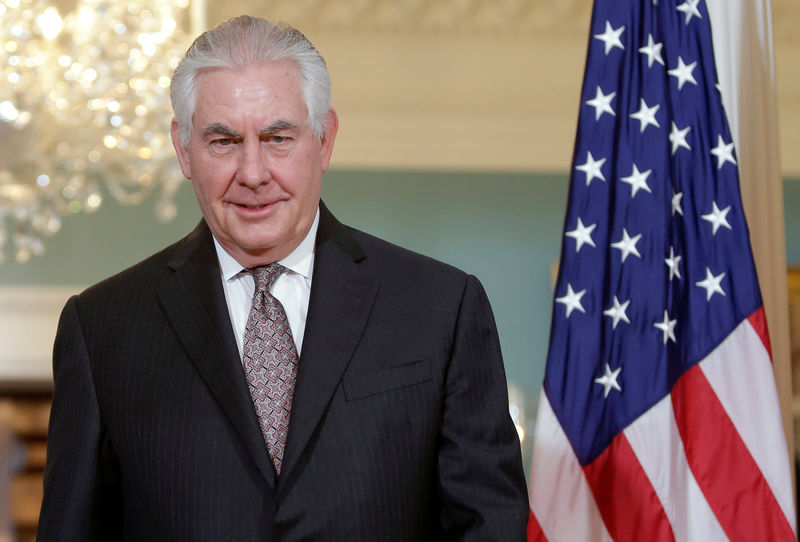By Crispian Balmer and Steve Scherer
ROME (Reuters) - Italy's preparations for hosting this year's Group of Seven major powers meetings have been hampered by the slow transition at the U.S. State Department, which has created decision-making bottlenecks, European diplomatic sources said.
The G7 draws together the United States, Japan, Germany, France, Britain, Italy and Canada, with countries taking it in turn to draw up agendas that they see as of pressing concern.
Italy holds the 2017 presidency and its objectives laid out this week appeared to put Rome on a collision course with U.S. President Donald Trump by promoting highly sensitive topics such as climate change, free trade and immigration initiatives.
The G7 foreign ministers meet in Tuscany on April 10-11, preparing for a leaders' summit in Sicily at the end of May.
However, officials, who spoke on condition of anonymity because of the sensitivity of the issue, said efforts to reach an agreement on statements and strategy ahead of time - a normal part of pre-meeting G7 diplomacy - were going slowly.
The immediate concerns lay with the State Department, where new Secretary of State Rex Tillerson has left vacant numerous positions seen as vital to drafting summit accords.
"It's very difficult to talk to someone who can give a straight answer because the ones who are there are 'acting' head of something and they're not even very senior," said a senior Italian government official involved in G7 diplomacy.
The White House has yet to nominate candidates for either of the two deputy secretary of state slots, beneath Tillerson. Further down the chain, all six of the department's regional bureaus are led by acting assistant secretaries of state, while Trump has yet to appoint ambassadors to Italy or the Vatican.
"This has made it extremely difficult for us to prepare for the meeting," the government official added.
A State Department official acknowledged that some positions had yet to be filled, but said that it was preparing for a "successful" series of G7 meetings.
"We continue to have a deep bench of experienced and capable staff members serving in key positions and working closely with their G7 counterparts, including our Italian hosts," the official said.
A diplomat in another European capital also involved in G7 preparations said the department heads beneath the secretary of state were vital for getting approval for agendas, scheduling and the often delicate wording of policy statements.
"We no longer know who to talk to. It is slowing everything down," he said, adding that any ambitious projects would struggle to take off given the confusion.
A senior diplomat in a third EU capital said: "Since President Trump took office, it has become very difficult to deal with the State Department on planning and we are still learning to work with that."
NO FUNDING
The senior Italian diplomat leading behind-the-scenes G7 discussions, Raffaele Trombetta, said this week that Africa would play a prominent role in Italy's summit agenda, with seven African leaders invited to join the talks in Sicily.
However, in a sign that Rome was lowering expectations for this year's event, the Italian government was unlikely to launch any major funding initiative at a time when Trump is looking to slash back on U.S. foreign aid.
"Usually the G7 sets aside money for a particular cause, but this time it doesn't look like there's the will to do it. It's not just the Americans. The Japanese don't want one either," said the Italian government source.
Trombetta said "trust" was the presidency slogan - trust between governments and their citizens, and between countries.
"There is also a need of renewed trust between the leaders who will be attending the summit," he said, noting that the prime ministers of Britain and Italy and the presidents of France and the United States would be attending their first G7.
EU leaders worry Trump might undermine 70 years of strong trans-Atlantic ties and have been alarmed by his criticism of NATO, his support for trade protectionism, his rejection of climate change policies, and his anti-migrant rhetoric.
Flying into these headwinds, Trombetta said Italy wanted the G7 to reaffirm the importance of the 2015 Paris agreement, which obliges nations to curb global warming and which senior White House advisers have called on Trump to renounce.
Rome was also eager for a commitment "to fighting all forms of protectionism", said Trombetta. However, he acknowledged that this might be hard to achieve, with the United States this month already breaking with a tradition of endorsing open trade at a meeting of G20 finance ministers in Germany.
"It is a highly political issue. I expect it will go up to the leaders. It will be dealt with by them at the Taormina summit ... It will be one of the main points of tension of our presidency," he said.
Italian Prime Minister Paolo Gentiloni is flying to the United States next month, in part to seek an understanding with Trump on the G7 agenda ahead of the Sicily summit.
But if Trump pushes back, he is unlikely to face strong resistance from Italy, which has made good relations with the United States the cornerstone of its foreign policy.

"We can argue with France, Germany and Britain, but never with America," said another senior government official, who was not authorized to talk to the media. "We will do with Trump what we always do (with the Americans); find a way to get along with him."